Key takeaways:
- Energy audits reveal inefficiencies in energy consumption and provide actionable recommendations for improvement, enhancing both cost savings and comfort.
- Implementing energy-efficient practices promotes sustainability, reduces operational costs, and fosters innovation within organizations.
- Effective techniques in energy audits include thermal imaging, analyzing energy bills, and conducting onsite inspections to identify areas for improvement.
- Personal engagement in energy efficiency initiatives can lead to enhanced awareness, teamwork, and educated decision-making for sustainability in communities.
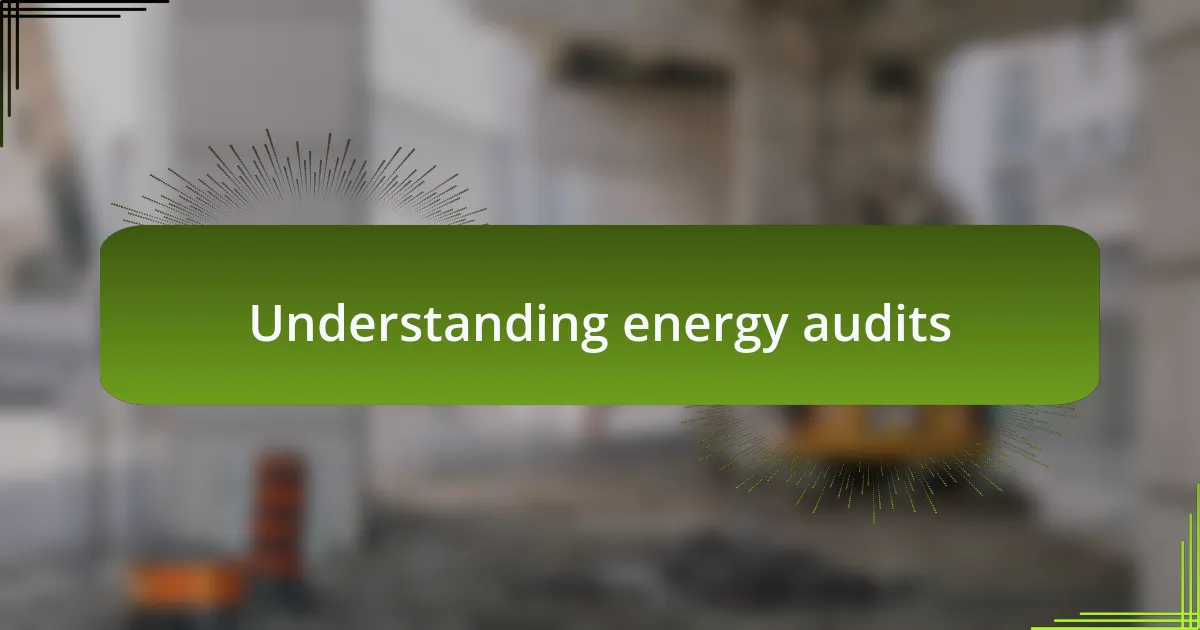
Understanding energy audits
Energy audits are fascinating assessments that provide a clear picture of how energy is consumed in a facility. I still remember my first audit; it was eye-opening to witness how small changes in energy usage could lead to significant savings. Have you ever wondered where all that energy goes while you’re not paying attention?
During an energy audit, every nook and cranny of a building is scrutinized. The team checks insulation, heating systems, and even appliances to identify inefficiencies. I often marveled at how simple fixes could not only reduce costs but also boost comfort levels—it’s like finding hidden treasures in a space you thought you knew well.
The results from these audits can be quite illuminating. I was often amazed at how a detailed report highlighted not just issues, but also actionable steps towards improvement. Seeing these changes implemented felt like being part of a larger mission for sustainability—it’s a rewarding experience that connects you to the bigger picture of energy conservation.
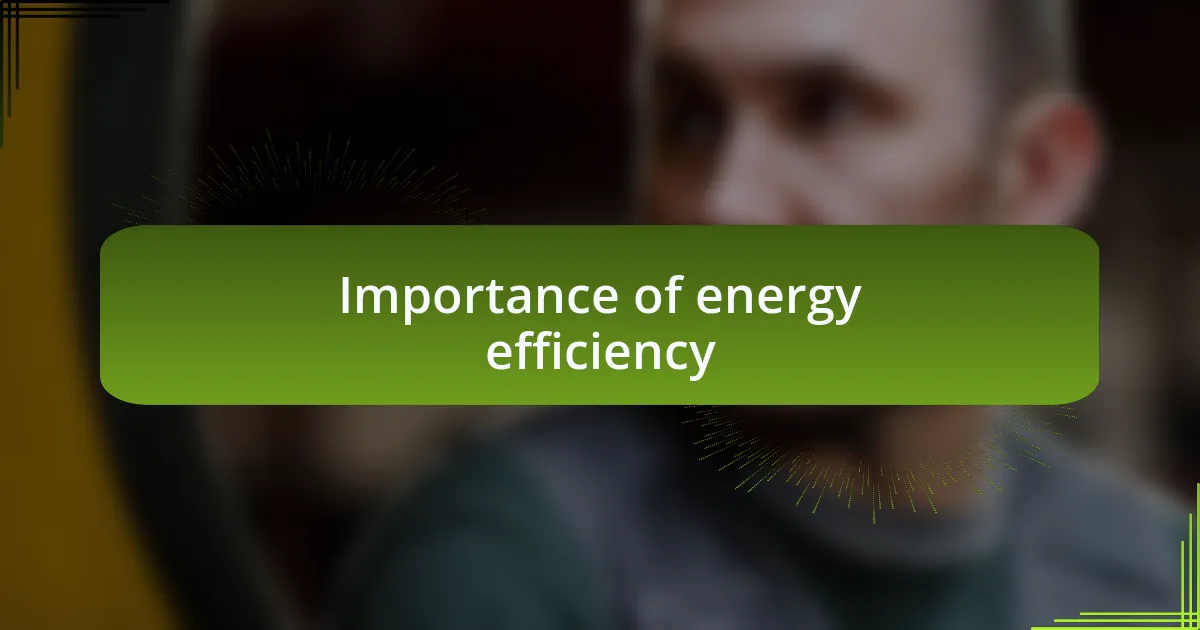
Importance of energy efficiency
When I first delved into energy efficiency, it struck me how crucial it is to both our wallets and the environment. I remember sitting in a meeting where we discussed the staggering amount of wasted energy due to outdated systems. It made me think: why leave money on the table when smarter choices could yield significant benefits?
Energy efficiency isn’t just about saving cash; it’s about sustainability and responsible stewardship of resources. During one project, we replaced old lighting with LEDs, and the transformation was remarkable. Not only did the energy bills drop, but we also created a more pleasant atmosphere—one where productivity flourished, and everyone felt more energized.
Moreover, energy efficiency often acts as a catalyst for innovation within organizations. I witnessed a team that, inspired by their audit results, pioneered new, energy-saving practices that led to enhanced operational efficiency. This experience taught me that embracing energy efficiency can propel a business forward, creating a culture of continuous improvement and environmental consciousness. What if every company took similar steps? The collective impact would be profound.
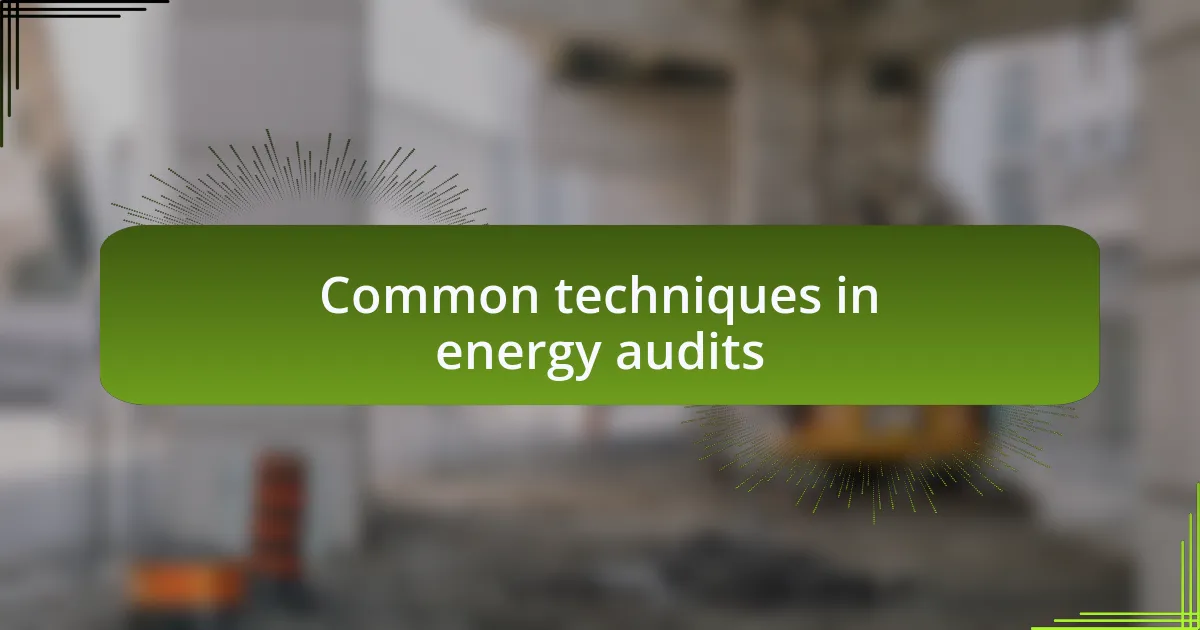
Common techniques in energy audits
One common technique in energy audits is the use of thermal imaging cameras. I vividly recall my first experience with one during an audit of an aging facility. The camera revealed hidden thermal leaks in the insulation that the naked eye couldn’t detect. Identifying these issues not only highlighted the immediate need for repairs but also instilled a sense of urgency within the team to prioritize energy-saving measures.
Another effective approach is the analysis of energy bills over time. This method has led me to uncover patterns that point to inefficiencies. For instance, I once reviewed the energy usage of a manufacturing plant and discovered monthly spikes in usage that correlated with the operation of outdated machinery. This insight initiated discussions about potential upgrades that ultimately reduced operational costs and environmental impact.
Additionally, I’ve found that conducting onsite walk-throughs can yield invaluable insights. During a recent audit, I walked through an office building and noticed excessive use of lighting in areas that were rarely occupied. This prompted a conversation about installing motion sensors, which not only curtailed unnecessary energy consumption but also sparked a new awareness among faculty about their energy habits. Can you imagine the difference if everyone took such simple steps?

Discovering personal benefits
I discovered that the personal benefits of energy audits extend far beyond mere cost savings. One day, after a particularly revealing audit, I felt a renewed sense of purpose. Knowing that my work directly contributed to reducing waste made me proud and motivated to advocate for more sustainable practices in my community. Have you ever had that moment where you realize your actions can have a broader impact? It truly changes how you perceive your role in environmental stewardship.
Moreover, I learned that energy audits foster teamwork and collaboration. During one audit, our diverse team came together, each bringing unique perspectives that led to innovative solutions. This experience not only deepened our camaraderie but also made me appreciate the strengths of collective problem-solving. Could it be that working together on energy efficiency initiatives made us more aware of our individual habits as well? I believe it did, as we all began sharing tips and encouraging one another to be more energy-conscious.
Lastly, I realized that energy audits can serve as a powerful educational opportunity. When I presented findings to stakeholders, it sparked enthusiastic discussions about changing behaviors and implementing new technologies. It illuminated the path forward, proving that audits do more than measure efficiency; they empower you to make informed decisions. Isn’t it gratifying to see how knowledge can translate into tangible action, leading to a more sustainable future?
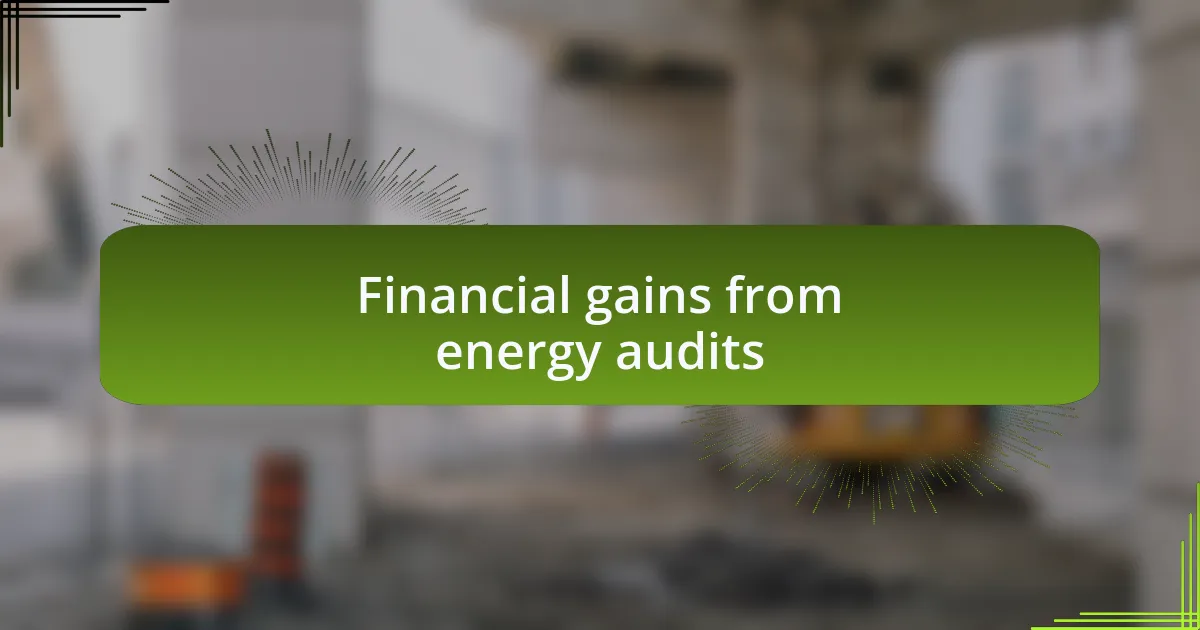
Financial gains from energy audits
Notably, the financial gains from energy audits can be striking. For instance, after one audit at a facility where I worked, we discovered inefficiencies that were costing us hundreds of dollars each month. Implementing the recommended changes not only reduced our utility bills significantly but also generated savings that funded additional projects within our engineering team. Have you ever noticed how quickly small changes can add up to large sums?
It’s also fascinating how energy audits can enhance property value. By making energy-efficient upgrades based on audit findings, I increased my own home’s market appeal. Potential buyers were attracted not only by the modern amenities but also by the lower energy costs, resulting in a faster sale at a premium price. Isn’t it reassuring to know that investing in efficiency today can yield financial benefits down the road?
Lastly, I’ve often reflected on the long-term financial advantages of energy audits. They serve as a catalyst for businesses to adopt sustainable practices that go beyond immediate savings. For example, one company I collaborated with faced a hefty energy bill, which prompted them to evaluate their entire system. The audit revealed a mismanaged HVAC system, and once it was optimized, not only did they see reduced costs, but the investment paid dividends through increased employee productivity. How many other hidden costs could we uncover with a few well-placed inquiries?
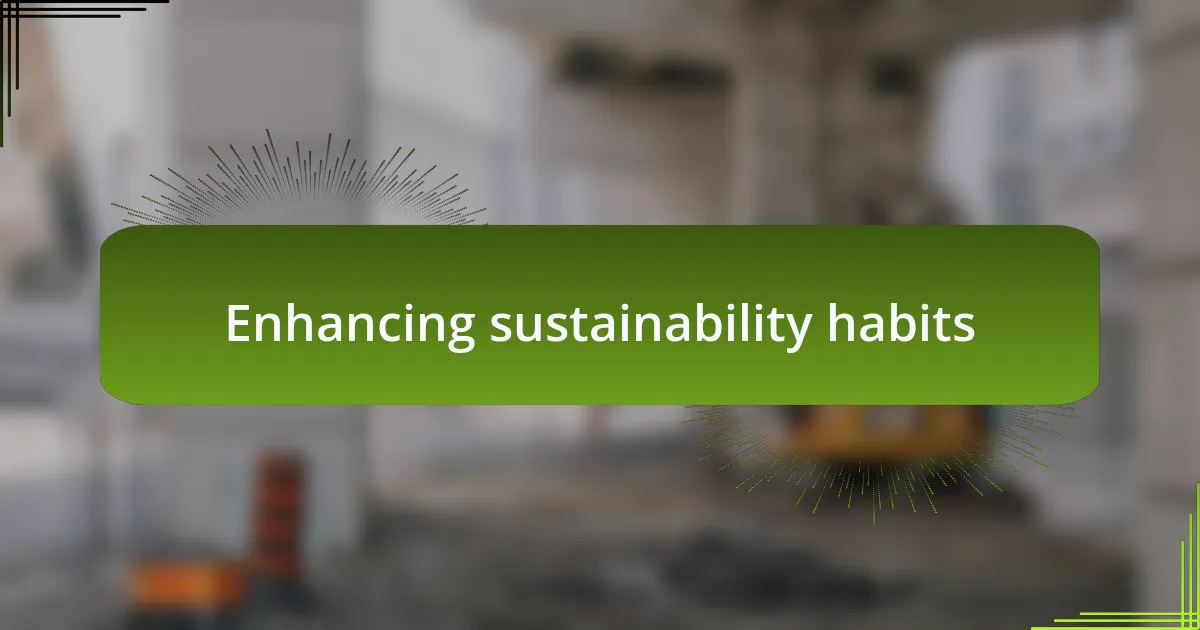
Enhancing sustainability habits
Enhancing sustainability habits is not just a trend; it has become a necessity in our modern world. When I embraced the recommendations from my energy audit, I found myself becoming more mindful about my daily energy consumption. It was eye-opening to see how simple changes, like adjusting my thermostat or unplugging devices I wasn’t using, could lead to a more sustainable lifestyle. Isn’t it amazing how awareness can transform habits?
One particular change that stands out for me is the transition to energy-efficient lighting. After the audit, I replaced all my old bulbs with LED alternatives, which not only reduced my energy usage but also created a warmer, more inviting atmosphere in my home. My friends even commented on how much cozier my space felt. Have you ever experienced a shift in your surroundings that prompted you to rethink your consumption?
Moreover, the audit sparked a broader awareness in my household about sustainability practices. We started a family conversation about recycling, composting, and rethinking waste. It felt rewarding to take collective action toward being more environmentally responsible. I realized that sustainability isn’t just individual—it can unite and inspire communities. How powerful can shared habits be in paving the way for a greener future?
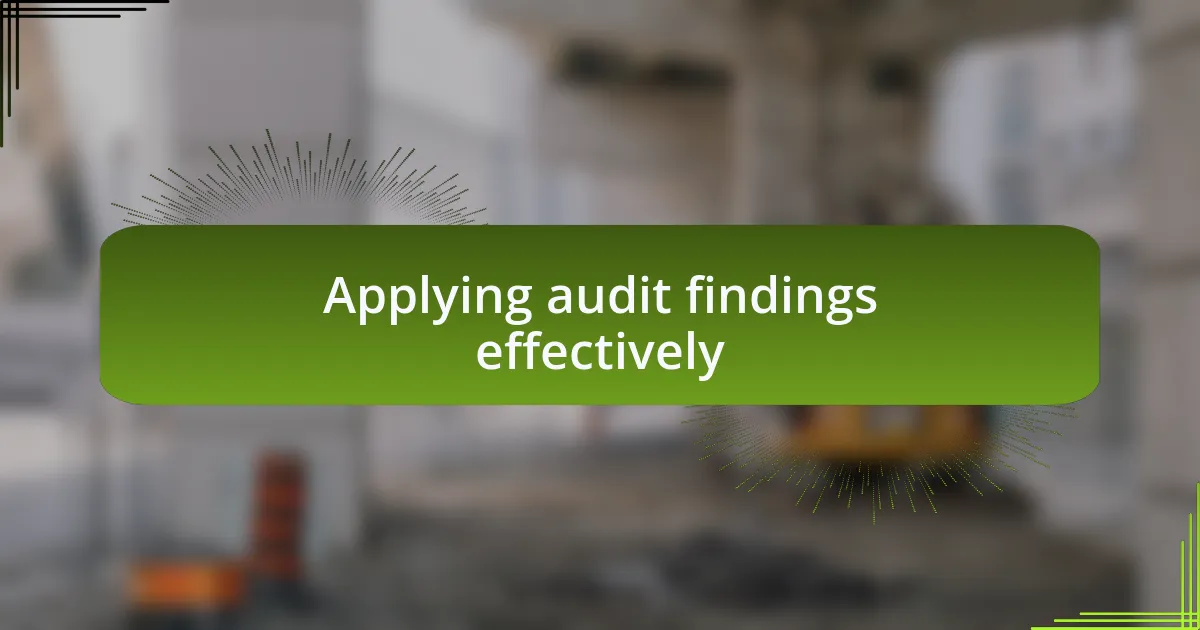
Applying audit findings effectively
Applying the findings from an energy audit effectively can feel overwhelming at first, but I discovered that a step-by-step approach made all the difference. For instance, after identifying the major energy drains in my home, I prioritized the changes that would bring the highest return on investment. This meant focusing first on insulation improvements, which led to noticeable drops in my heating costs. Have you ever pinpointed a single action that brought about surprising results?
One practical step I adopted was establishing a routine check on my energy usage every month. By tracking my consumption and comparing it to my audit recommendations, I found myself more engaged in the process. It felt rewarding to see my efforts reflected in lower utility bills. That small routine turned into a significant habit—how could simple metrics transform your perception of energy efficiency?
I also discovered that sharing these audit findings with my family amplified our efforts. We set specific goals, like reducing our collective energy consumption by 20% over six months. This accountability not only motivated us but also created a bonding experience as we celebrated milestones together. Isn’t it fascinating how a common goal can bring people closer while fostering a sense of responsibility?